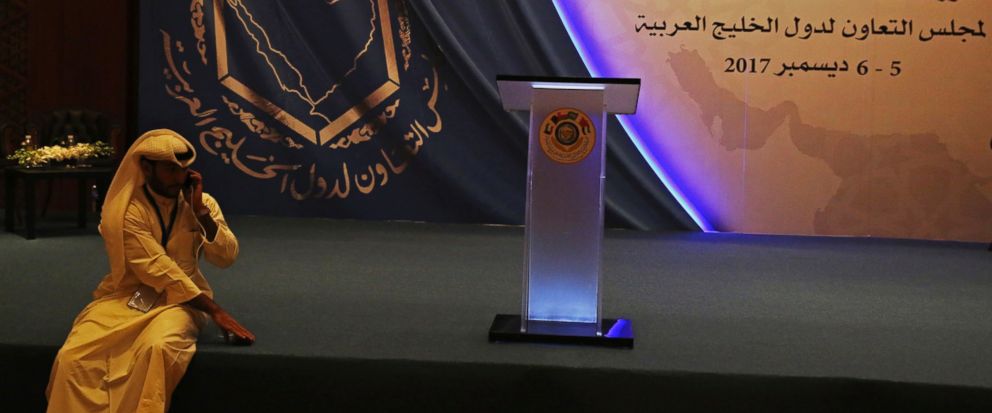Gulf nations await crucial summit on Qatar diplomatic crisis
Kuwait prepared on Tuesday to host a crucial meeting of the six-nation Gulf Cooperation Council as half of its members still boycott member-state Qatar, a diplomatic dispute that's cleaved the Arabian Peninsula.
The fact the meeting will take place at all comes as a surprise, given the unusually sharp criticism among the typically clubby members of the GCC pointed at Doha.
That alone, however, won't be enough to salvage the GCC, a group of American-allied Gulf Arab nations formed in part in 1981 as a counterbalance to Shiite power Iran. The United States and its European allies all have told the council's members that the region remains stronger with them working together as a whole, while the countries themselves still appear divided over their future.
"This is the most important annual summit the GCC has held for more than two decades," said Kristian Coates Ulrichsen, a research fellow at the James A. Baker III Institute for Public Policy at Rice University. "The GCC needs to illustrate its relevance after having been bypassed at every stage of the Qatar crisis."
The dispute began in June, following what Qatar described as a hack of its state-run news agency that saw incendiary comments attributed to its ruler, Sheikh Tamim bin Hamad Al Thani. Soon after, GCC members Bahrain, Saudi Arabia and the United Arab Emirates closed off their airspace and seaports to Qatar, as well as the small peninsular nation's sole land border with Saudi Arabia.
The boycott initially reeled Doha, though it soon replaced food products with those flown in from Turkey and Iran.
However, Qatar's foreign reserves have dropped by some $10 billion — a fifth of their value — since the dispute began. Those reserves are crucial in supporting the nation's riyal, which is pegged to the U.S. dollar, as well as funding the upcoming 2022 FIFA World Cup that Doha will host.
For boycotting nations, they allege Qatar funds extremist groups and has too-cozy ties to Iran. Qatar has long denied funding extremists but it restored full diplomatic ties with Iran during the crisis. Doha shares a massive offshore natural gas field with Tehran that gives its citizens the highest per-capita income in the world.
A similar dispute involving Qatar erupted in 2014. But this time positions have hardened against Qatar, whose support for Islamist opposition groups has angered the Arab nations now boycotting it. The UAE in particular views Islamists as a threat to hereditary rule in its federation of seven sheikhdoms. Egypt, angered by Qatar's support for the Muslim Brotherhood and the nation's deposed President Mohammed Morsi, is also boycotting Doha.
The U.S., which has some 10,000 troops stationed at Qatar's sprawling al-Udeid Air Base as part of its campaign against the Islamic State group and the war in Afghanistan, also has sought to end the crisis. Its military has halted some regional exercises to put pressure on the GCC to resolve the crisis. However, President Donald Trump in the meantime made comments seemingly supporting the Arab nations' efforts at isolating Qatar, complicating those efforts.
A Trump-prompted call in September between Qatar's Sheikh Tamim and Saudi Crown Prince Mohammed bin Salman that offered a chance at negotiations also broke down in mutual recriminations.
Kuwait's 88-year-old emir, Sheikh Sabah Al Ahmad Al Sabah, has tried to mediate the dispute, so far without success. However, Kuwait appeared in recent days to secure promises from the GCC to attend its annual high-level summit.
It remains in question who will attend from each member state. Bahrain had sworn it would not attend any meeting that featured Qatar, though a lower-level official attended a meeting of GCC foreign ministers on Monday in Kuwait City. Qatar's Shiekh Tamim already committed to attending, while Oman said another official would represent Sultan Qaboos bin Said.
Ahead of the summit, however, Kuwait showed it remained committed to Gulf unity. Staffers from the Doha-funded Al-Jazeera satellite news network, which boycotting nations have demanded be shut down, openly reported from the summit and one of its journalists spoke live to Kuwaiti state radio.
But the GCC meeting also represents more than just the Qatar crisis. The long-stalemated Saudi-led war in Yemen suffered a new setback with the death Monday of former Yemeni President Ali Abdullah Saleh, who recently defected from the Shiite rebels holding its capital.
Meanwhile, a new generation of Gulf leaders is rising, like Saudi Arabia's assertive 32-year-old Crown Prince Mohammed bin Salman, who launched the Yemen war and has been more confrontational with Iran.
"The Saudi camp is seeking to commit the Gulf states to a hard-line anti-Iran policy and adherence to Saudi leadership," Ayham Kamel, the head of the Middle East and North Africa division of the Eurasia Group, wrote in an analysis published Tuesday. "While the UAE believes its interests are best served by an alliance with Saudi Arabia, and Bahrain is compelled to follow Riyadh's lead, the other Gulf states are much more hesitant to do so."
———
Follow Jon Gambrell on Twitter at www.twitter.com/jongambrellap . His work can be found at http://apne.ws/2galNpz .
- Star
Add Interests Customize your news feed by choosing the topics that interest you.
To save your interests across all devices Log In or Sign Up »Source – abcnews.go.com

